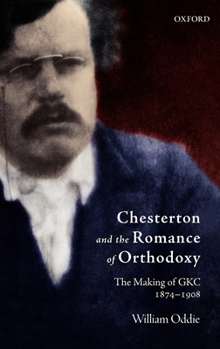Chesterton and the Romance of Orthodoxy: The Making of Gkc, 1874-1908
Select Format
Select Condition 
Book Overview
On the publication of Orthodoxy in 1908, Wilfrid Ward hailed G. K. Chesterton as a prophetic figure whose thought was to be classed with that Burke, Butler, Coleridge, and John Henry Newman. When Chesterton died in 1936, T. S. Eliot pronounced that 'Chesterton's social and economic ideas were the ideas for his time that were fundamentally Christian and Catholic'. But how did he come by these ideas? Eliot noted that Chesterton attached 'significance...
Format:Hardcover
Language:English
ISBN:0199551650
ISBN13:9780199551651
Release Date:January 2009
Publisher:Oxford University Press, USA
Length:416 Pages
Weight:1.70 lbs.
Dimensions:1.2" x 6.3" x 9.6"
Customer Reviews
0 rating





